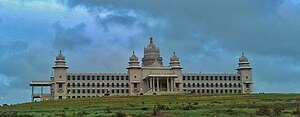Karnataka Legislative Assembly | |
|---|---|
| 16th Legislative Assembly of Karnataka | |
 | |
| Type | |
| Type | Lower house of Karnataka Legislature |
Term limits | 5 years |
| Elections | |
| First past the post | |
Last election | 10 May 2023 |
Next election | May 2028 |
| Meeting place | |
 | |
| Legislative Assembly building, Vidhana Soudha, Bangalore, Karnataka, India. | |
 | |
| Legislative Assembly building, Suvarna Vidhana Soudha, Belagavi, Karnataka, India (Winter session) | |
| Website | |
| Karnataka Legislative Assembly | |
| Footnotes | |
| The Council was established in 1881 for the Princely State of Mysore. The princely state was merged with the Dominion of India and became Mysore State in 1947; Mysore State was re-organized to its current territorial state in 1956 and renamed as Karnataka on 1 November 1973. | |
The Karnataka Legislative Assembly is the lower house of the bicameral legislature of Karnataka state in India. Karnataka is one of the six states in India, where the state legislature is bicameral, comprising two houses. The two houses are the Vidhan Sabha (lower house) and the Vidhan Parishad (upper house).
In summer, the seat of the Legislative Assembly is in Bangalore, the capital of the state, while in winter it is at Belagavi, in the northern part of the state. The term of the Legislative Assembly is five years, unless dissolved earlier. Presently, it comprises 224 members who are directly elected from single-seat constituencies.
Since the independence of India, the Scheduled Castes (SC) and Scheduled Tribes (ST) have been given Reservation status, guaranteeing political representation, and the Constitution lays down the general principles of positive discrimination for SCs and STs.[1][2]: 35, 137 The 2011 census of India stated that indigenous people constitute 7% of the state's total population, while people from the Scheduled Castes constitute 17.5% of the total population. Accordingly, the Scheduled Tribes have been granted a reservation of 15 seats in the assembly, while 36 constituencies are reserved for candidates of the Scheduled Castes.[3]
- ^ Kumar, K Shiva (17 February 2020). "Reserved uncertainty or deserved certainty? Reservation debate back in Mysuru". The New Indian Express. Archived from the original on 21 November 2021. Retrieved 29 November 2021.
- ^ "THE CONSTITUTION OF INDIA [As on 9th December, 2020]" (PDF). Legislative Department. Archived from the original (PDF) on 26 November 2021. Retrieved 30 December 2023.
- ^ Sharan Poovanna (22 January 2024). "Karnataka govt puts ball in Centre's court on SC sub-quotas. What is the issue & politics behind it". MSN. Retrieved 27 January 2024.
According to the 2011 Census, SCs make up 17.5 per cent of Karnataka's population, while the Scheduled Tribes (STs) account for 6.95 per cent. Of the state's 224 assembly constituencies, 36 are reserved for SCs and 15 for STs.